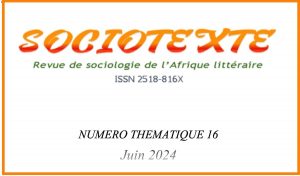. WOMEN’S EQUALITY .
An article from Fabula
Studies assembled and coordinated by Béatrice Kakou Assi, Department of Modern Letters, UFHB, Abidjan-Côte d’Ivoire.
Contrary to popular belief, the genres of traditional African oral literature are not fossils of our current literature and human sciences. Nor are their themes intended to be relegated to the residue stage of outmoded civilizations. On the contrary, traditional oral genres are anthropological universals and indicators of social mutations. They thus help to problematize the progress of man, in the sense that Seneca understood it, in the form of processual stations. They also help to understand and perfect human societies.

This is why Amadou Hampathé Bâ recommends that man “constantly return to the story during significant events in his life”[1]. Therefore, tales, legends, proverbs, myths, and other corpora relating to oral traditions – here, particularly African – should be read as authoritative sources for current issues: sustainable development, ecology, climate and the environment, human rights, the culture of peace and conflict management, the protection of biodiversity, women’s struggles, etc.
(Article continued in right column)
(Click here for the original in French.)
Can the women of Africa lead the continent to peace?
(Article continued from left column)
This last theme about feminine and feminist discourses in an oral and traditional African context validates the relevance of this thematic call from the journal Sociotexte. It will be a question of reflecting on the resilience of female and/or feminist figures in our oral texts, whether they are illustrious by their fame or anonymous by their invisibility. Contributions should therefore include:
`
– The struggle of women in tales, myths, legends and epics
– Figures of women, resistant or revolutionary
– Maxims and proverbs to the advantage of a shining image of women
– (Ancient) stories of the power of women (the myth of the mother goddess for example)
– Model figures for current feminist movements
– Stories of protection, celebration or deification of the “woman-mother”.
– Rebellions and revolts of women against the conventional places and roles assigned to women (warrior women or Amazons, etc.)- The female-male
– The mother or single woman (single, widowed or divorced)
—
Proposals are received at the following address:
kakousociotexte2024@gmail.com
The deadline is set for February 16, 2024.
— [1] Amadou Hampaté Bâ, Petit Bodiel, NEI/EDICEF, 1987, p.86.